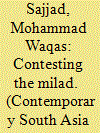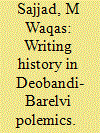| Srl | Item |
| 1 |
ID:
190940


|
|
|
|
|
| Summary/Abstract |
This article examines Deobandi and Barelvi discourses on the milād, the celebration of the Prophet Muhammad’s birthday, an important marker of Barelvi identity and a primary site of contestation. It argues that milād indicates a significant development in the discourses of conflict between the ‘ulamā (religious scholars) of the two traditions as they have moved from subtle debates into categorically oppositional ones in Pakistan. This includes diverging from the opinions of ‘ulamā of the past, given the present competitive context. The milād is a site, event, and ritual in which both groups of ‘ulamā situate themselves as orthodox lovers of the Prophet, and the other as disrespectful or bidatī, bringing innovations into Islam. This also shows Islam as a discursive tradition, as both the conflict on and the practices of milād find historical precedents to justify positions in the present, while demonstrating changes in emphasis, contestations, and perceptions of self and other over time. As a result, when the Deobandi and Barelvi traditions have come to oppose and embrace the milād, in almost absolute terms in Pakistan today, they are also demonstrating subtle but significant developments in South Asian Islam over the past century.
|
|
|
|
|
|
|
|
|
|
|
|
|
|
|
|
| 2 |
ID:
190727


|
|
|
|
|
| Summary/Abstract |
The Deobandi-Barelvi conflict in South Asia is conventionally over religious beliefs and practices. However, it also has an earlier dimension, encompassing the early nineteenth century theological debate between Shah Ismail and Fazl-e-Haq Khairabadi. Deobandi and Barelvi polemicists rewrite this history to establish their own tradition and identity within a particular narrative of the past, linked to the family of Shah Waliullah. The Barelvis portray their founder, Ahmed Raza Khan, as belonging to the tradition of both Waliullah and Khairabadi, and against Ismail, while the Deobandis highlight Ismail’s orthodoxy. In doing so, polemicists rewrite the past and ensure that the dimension of history is a significant aspect of their conflict today as distinct oppositional identities are created.
|
|
|
|
|
|
|
|
|
|
|
|
|
|
|
|